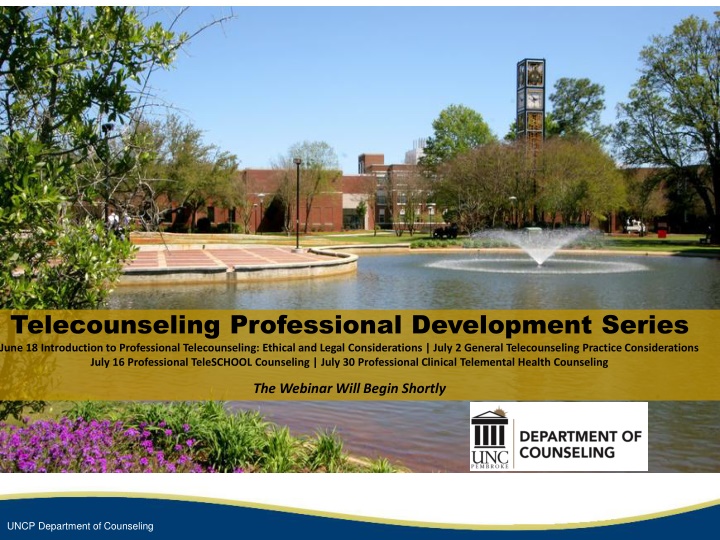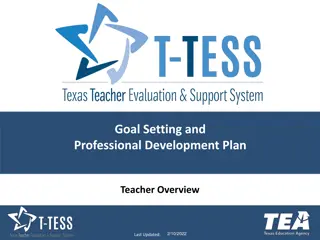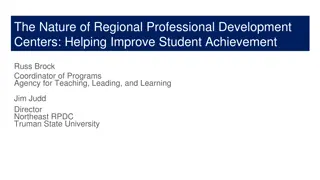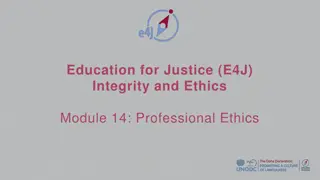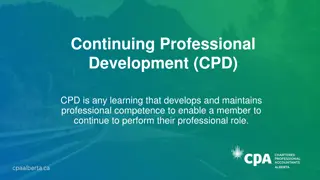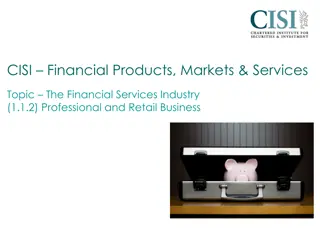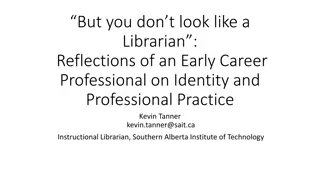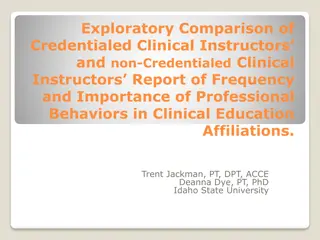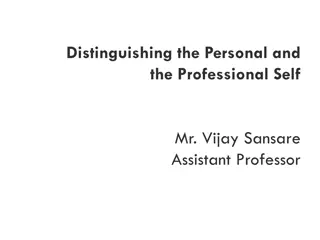Professional Telecounseling Development Series Overview
"Join the informative Professional Telecounseling Development Series conducted by UNCP Department of Counseling. Delve into ethical, legal, and practice considerations in telecounseling, led by experts Dr. Jeffrey M. Warren and Dr. Nicole Stargell. Earn CE clock hours and certificates by attending live webinars or watching recorded sessions. Learn about obtaining clock hours, program evaluations, and more to enhance your telecounseling skills. Explore telecounseling definitions, legal and ethical issues, and professional growth opportunities in this engaging series."
Download Presentation

Please find below an Image/Link to download the presentation.
The content on the website is provided AS IS for your information and personal use only. It may not be sold, licensed, or shared on other websites without obtaining consent from the author.If you encounter any issues during the download, it is possible that the publisher has removed the file from their server.
You are allowed to download the files provided on this website for personal or commercial use, subject to the condition that they are used lawfully. All files are the property of their respective owners.
The content on the website is provided AS IS for your information and personal use only. It may not be sold, licensed, or shared on other websites without obtaining consent from the author.
E N D
Presentation Transcript
Telecounseling Professional Development Series June 18 Introduction to Professional Telecounseling: Ethical and Legal Considerations | July 2 General Telecounseling Practice Considerations July 16 Professional TeleSCHOOL Counseling | July 30 Professional Clinical Telemental Health Counseling The Webinar Will Begin Shortly UNCP Department of Counseling
Dr. Jeffrey M. Warren, PhD, LCMHCS, LSC, NCC, NCSC Chair, Department of Counseling, Associate Professor of School Counseling UNCP Department of Counseling
Dr. Nicole Stargell, PhD, LCMHCA, LSC, NCC, BC-TMH Associate Professor, Department of Counseling UNCP Department of Counseling
Introduction to Professional Telecounseling: Ethical and Legal Considerations Department of Counseling The University of North Carolina at Pembroke College of Health Sciences UNCP Department of Counseling 4
CSI Phi Sigma Telecounseling Professional Development Series Obtaining CE Clock Hours with Certificate UNCP Department of Counseling 5
Obtain Clock Hours for the Live Webinar 1. Attend the whole webinar. 2. After completion of the live webinar, a program evaluation will pop up in your browser. 3. Complete the program evaluation survey. 4. Your certificate will be emailed after all four presentations in this series. 5. The recorded webinar, PPT slides, & handouts will be posted online. UNCP Department of Counseling 6
Obtain Clock Hours for the Recorded Webinar 1. Watch the whole webinar. 2. Complete the posttest online. 3. After completion of the posttest, you will receive an email with a link to the CE evaluation. 4. Complete the CE evaluation survey. 5. Your certificate will be emailed within 10 business days. UNCP Department of Counseling 7
Agenda Define Telecounseling Explore Legal Issues Explore Ethical Issues UNCP Department of Counseling 8
Poll Question How familiar are you with the ACA Code of Ethics Section H and/or the ASCA Ethical Standards Section A15? Not at all ___________________________________ 1 4 7 Very Much UNCP Department of Counseling 9
Poll Question I believe telecounseling can be helpful for the clients/students I serve. Very Little ___________________________________ 1 4 7 Very Much UNCP Department of Counseling 10
Poll Question What concerns do you have with telecounseling (select all that apply): Technology Client/student safety Confidentiality Effectiveness Other UNCP Department of Counseling 11
Defining Telecounseling Other Names Telebehavioral Health Behavioral Telehealth Distance Counseling E-counseling E-therapy Online therapy Cybercounseling Online Counseling UNCP Department of Counseling 12
Defining Telecounseling Telehealth Healthcare Provider in One Place Patient or Client in Another Place Healthcare Administered via Technology (HRSA, 2019) Clinical Mental Health Counselors provide direct services to individuals, groups, families, and couples Professional School Counselors provide indirect and direct services to students UNCP Department of Counseling 13
Defining Telecounseling Indirect Student Services Program Development and Evaluation Collaboration Referrals Direct Student Services Instruction/Core Curriculum Individual Student Planning Responsive Services UNCP Department of Counseling 14
Telecounseling Professional Teleschool Counseling Crisis Response Individual & Group Counseling (ASCA, 2019; 2020) Clinical Telemental Health Counseling Mental Healthcare Provider in One Place Student or Client in Another Place Mental Healthcare Administered via Technology (NBCC, 2020) UNCP Department of Counseling 15
Methods of Delivery Videoconferencing Computer Programs Mobile Applications Telephone? UNCP Department of Counseling 16
Defining Telecounseling Scheduling appointments using email or telephone? Sending worksheets via email? A counseling session over the phone? UNCP Department of Counseling 17
Poll Question Are you currently providing telecounseling? Yes No UNCP Department of Counseling 18
Poll Question Were you regularly providing telecounseling before COVID-19? Yes No UNCP Department of Counseling 19
ASCA Ethical Standards School Counselors Adhere to the same ethical guidelines in a virtual/distance setting Implement procedures for students to follow in emergencies and non-emergencies Inform students and guardians of limitations and benefits of virtual/distance counseling (A.15.) UNCP Department of Counseling 20
ACA Code of Ethics Section H: Distance Counseling, Technology, and Social Media Counselors actively attempt to understand the evolving nature of the profession with regard to distance counseling, technology, and social media and how such resources may be used to better serve their clients. Counselors strive to become knowledgeable about these resources. UNCP Department of Counseling 21
Benefits of Telecounseling Accessibility No Driving Required Lack of Local Providers Emergency Situations (e.g., physical distancing) Scheduling Flexibility (adjust for time zones) Privacy and comfort See clients personal lives Cost-effective UNCP Department of Counseling 22
Benefits of Telecounseling Effectiveness Veterans receiving telemental health services growing 22% annually (Darkins, 2016) VA determined there is no significant difference between the effectiveness of telemental health services and in-person mental health services Tracked 96,609 Psychiatric admissions declined 24%, length of stay decreased 27% (Godleski, Darkins, & Peters, 2012) UNCP Department of Counseling 23
Benefits of Telecounseling Effectiveness Telemental health appears to be comparable to in-person care (Hilty et al., 2013) Therapeutic relationship can be built successfully (Backhaus et al., 2012) Can address a broad range of concerns with diverse populations (Backhaus et al.; Springer et al., 2020) UNCP Department of Counseling 24
Risks of Telecounseling Risks to Confidentiality due to the nature of technology and the client s location Technology Issues accessibility, trustworthiness, reliability Buy-in, and support for telehealth, from patients and clinicians depends on robust and reliable services. (Darkins, 2016) Crisis Response establish a plan before Effectiveness still being researched UNCP Department of Counseling 25
Primary Resources for Telecounseling ACA Code of Ethics Section H: Distance Counseling, Technology and Social Media https://www.counseling.org/resources/aca-code- of-ethics.pdf ASCA Ethical Standards for School Counselors https://www.schoolcounselor.org/asca/media/as ca/Ethics/EthicalStandards2016.pdf UNCP Department of Counseling 26
Primary Resources for Telecounseling NBCC Policy Regarding the Provision of Distance Professional Services https://www.nbcc.org/Assets/Ethics/NBCCPoli cyRegardingPracticeofDistanceCounselingBo ard.pdf UNCP Department of Counseling 27
NBCC Telecounseling presents unique ethical concerns Technology continues to advance and use continues to increase and evolve Includes telephone, email, chat, and video Adhere to all NBCC policies and procedures, including the code of ethics Important to backup data UNCP Department of Counseling 28
ACA, AMHCA, LPCANC & ASCA Insurance Healthcare professionals providing telehealth must adhere to the same practice standards they follow when providing traditional in-person treatment and care. Practice in accordance with the standard of care, the limits of one s license, and all regulations and ethical guidelines. Contact your insurance carrier to confirm UNCP Department of Counseling 29
ACA H.1.b. Counselors who engage in the use of distance counseling, technology, and social media within their counseling practice understand that they may be subject to laws and regulations of both the counselor s practicing location and the client s place of residence. UNCP Department of Counseling 30
Distance Counseling Policy the North Carolina Board of Licensed Clinical Mental Health Counselors has confirmed that it has no separate view per se with regard to the provision of services via electronic means as long as a licensee is practicing in a manner consistent with his/her training and experience, is receiving supervision as is appropriate, and the medium for doing so is not an issue. UNCP Department of Counseling 31
Distance Counseling Policy The Board considers that the practice of counseling occurs both where the counselor who is providing counseling services is located and where the individuals (clients) who are receiving services are located. www.ncblpc.org UNCP Department of Counseling 32
Supervision 21 NCAC 53 .0212 Video supervision is permitted as long as the session is synchronous and involves verbal and visual interaction during the supervision. All supervision, whether live or audio and video recordings, shall be done in a confidential manner in accordance with the ACA Code of Ethics. HIPAA and FERPA: supervisee files and videos Explain risks and ethical considerations UNCP Department of Counseling 33
ACA H.2.d. Counselors take reasonable precautions to ensure the confidentiality of information transmitted through any electronic means. UNCP Department of Counseling 34
Legal Issues Bound by HIPAA/FERPA Limit PHI to what is therapeutically necessary End-to-end encryption- 256 bit Devices computer (desktop/laptop), tablet, cellphone Platform video, audio Cellular service, internet service Communication email, phone, text, mail Storage cloud, hardware (e.g., jump drive, hard drive), paper Payment UNCP Department of Counseling 35
Legal Issues Devices Computer Laptop or desktop Should be password-protected Hard drive should be encrypted Telephone/tablet Enable 6-digit password Encrypted; apple products are encrypted Landlines are secure UNCP Department of Counseling 36
Legal Issues Platform Business Associate Agreement (BAA) Cellular Service/Internet Service Conduit Exception (phone/internet provider) Wifi? Use a password protected router Use VPN on other wireless networks (e.g., hotels, fast food) Purchase from internet provider Purchase online UNCP Department of Counseling 37
Legal Issues Communication Electronic Health Record (EHR) Platform Encrypted email Automatic reply that indicates: Will respond within 8 business hours Contact 911 for emergencies No texting Will return a text message with a phone call or email Mail return address UNCP Department of Counseling 38
Legal Issues Communication Telephone How to prove identity: code word, numbers Interception by others: purposeful interception, public use of cell phones vs. private use of home phones Voicemail Receiving: private access codes Leaving: permanence of message, no control over who hears the message, how to phrase message UNCP Department of Counseling 39
Guidelines for Telephone Calls 1.Never acknowledge that clients are receiving services or give out information regarding clients to unknown callers. Explain that in respect for the privacy of clients, such information is not given out unless clients first sign authorizations. Explain how authorizations from clients can be obtained. 2.Make efforts to verify that you are talking to the correct person when you receive or make calls in which confidential information is discussed. 3.Keep in mind the possibility that your conversation is being recorded or monitored by an unauthorized person. (Remley & Herlihy, 2014, p. 255) UNCP Department of Counseling 40
Guidelines for Telephone Calls 4. If you discuss confidential information regarding a client on the telephone, be professional and cautious throughout the conversation. Avoid becoming friendly or informal, or saying anything off the record. 5. Remember that a record will exist at the telephone company that this telephone call was made or received. 6. Do not say anything during the conversation that you would not want your client to hear or that you would not want to repeat under oath in a legal proceeding. (Remley & Herlihy, 2014, p. 255) UNCP Department of Counseling 41
Legal Issues Storage BAA for cloud storage and EHR platforms External hard drive should be password- protected and encrypted Lock paper files UNCP Department of Counseling 42
Poll Question Do you currently use an EHR? Yes No UNCP Department of Counseling 43
Guidelines for Computerized Records 1. Try to avoid using a computer to which others have access. If this is not possible, store your records in a section that only you and authorized others can access. 2. Use passwords for accessing the files in the computer. Keep passwords secure, limit the number of individuals who know passwords, and change the passwords periodically. 3. Any time a confidential record is printed from a computer, ensure that it is handled as other confidential materials would be. UNCP Department of Counseling 44
Guidelines for Computerized Records 4. Avoid placing computers with monitors in public areas where unauthorized persons might accidentally see confidential information. 5. Limit access to computer equipment that is used to enter and retrieve confidential records. 6. Delete computer-stored records on the same basis that traditional records would be destroyed. Keep in mind, though, that deleted files usually can be retrieved by computer experts from a computer s hard drive even after they have been deleted. UNCP Department of Counseling 45
Guidelines for Computerized Records 7. When information is downloaded from a computer s hard drive to a storage device, or transferred electronically, make sure that confidential material is not accidentally included. 8. Be careful in networking a computer used for confidential information. The more computers that can access information, the greater the chance that confidential information will be compromised. 9. Use a coding system rather than client names on storage device labels so that the client identity is not obvious to anyone who might see the labels. UNCP Department of Counseling 46
Guidelines for Computerized Records 10.Regularly update virus protection software. 11.Make a backup copy of all files, and keep them in a location that is secure but separate from the originals. (Remly & Herlihy, 2014, p. 261) UNCP Department of Counseling 47
Legal Issues Payment Encrypted virtual platform BAA Paper checks Ask clients Password protect computers/phones/tablets Encrypt phones and tablets Use secure network/cellular data or a VPN Encrypt where electronic documents stored Encrypt email UNCP Department of Counseling 48
Ethical Issues Informed Consent (ACA 2014, Section H) Distance counseling credentials Physical location of practice and contact information Risks and benefits of telemental health counseling Technology failure and alternate methods Anticipated response time Emergency procedures UNCP Department of Counseling 49
Ethical Issues Informed Consent (ACA 2014, Section H) Time zone differences Cultural and/or language differences Possible denial of insurance Social media policy I don t use social media for professional purposes You can access information at our website UNCP Department of Counseling 50
